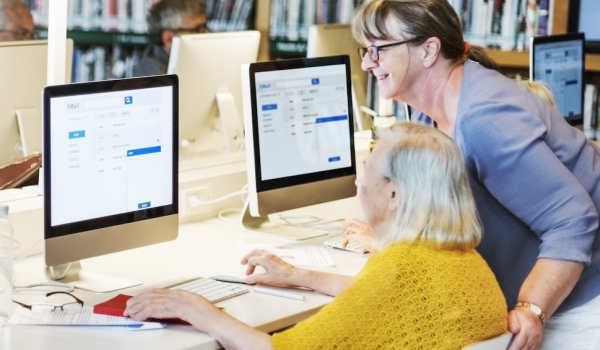We work with more libraries than we can count! This is a reflection of the many ways that libraries are used as a leading part of digital inclusion projects...
Libraries are uniquely placed to run successful Digital Champions programmes. They are:
- Trusted and connected. They sit at the heart of communities, and the crossroads of the local authority networks and community groups.
- They have Wi-Fi and computers, and are welcoming, warm spaces with staff.
- They can reach the hardest to reach. Those who are least likely to have digital skills or to be reached by digital methods, but who need these skills the most.
- They are already doing it! Library staff are always being asked for help with digital skills. Not helping is not an option - but providing training and support for staff and volunteers is!
Hard stats
- 33% of adults with a long-term disability have visited a library in a year. As have 33% of people without jobs.
- And 15% of the most deprived adults.
- After borrowing, using the computer/ printing is the most common reason people will visit.
- 26% of adults use online library services at least once a month.
More facts and stats from Libraries Connected, who have a lot of useful info about digital inclusion.
We have given all staff in branch libraries access so they can build up their confidence and knowledge and give day to day support for customers. It is working!
Catherine Clark
Cumberland Libraries
What's in it for libraries?
Learning digital skills has the capacity to change people's lives for the better. That's a big achievement. But there are other benefits for libraries in running structured Champions projects, as they:
- Build digital skills and confidence in staff. And it can contribute to Continued Professional Development (CPD).
- Provide a formal structure for something libraries are doing already, but with training, safe-guarding support and impact measurement.
- Use volunteers in a way that complements staff resources.
- Make staff and volunteers happy – people enjoy being Champions!
- Bring people into the building and make what the library offers accessible to a wider range of people.
- Reach diverse and targeted communities: for example, with Champion sessions in languages that aren’t English.
- Connect services across the council (like digital, health initiatives, resident support).
- Be a foundation on which to bring in funding from other sources and widen the digital skills offer (eg: device loans).
How does it work?
There are two main ways in which libraries run Digital Champion programmes, and these are outlined below. Many libraries are also used by community groups and local authorities as a venue in which to run digital sessions, so these aren't the frameworks that put Champions to work.
Light-touch Support
Brent Council has a ‘make every contact count’ policy.
- All front-facing staff have a Digital Champion responsibility in their contracts.
- All library staff are trained Digital Champions.
- They help people learn to use library systems and computers, and sign-post to other resources, like digital skills courses.
Drop-in sessions
Southampton Libraries run drop-ins with a team of volunteers...
- Up to 10 trained Champions provide drop-in sessions at libraries across the city.
- Volunteers are welcomed into the library team and supported by staff.
- Staff help library users with digital skills when they can.
It’s all going good! We’re helping everyone! We’re pointing them in the right direction and we’re teaching them IT skills too! And how to be self-sufficient! We don’t spoon feed – and we use our time effectively!
Alex Cameron
Wembley Library
How could you use Digital Champions?
Do our free interactive planner and find out!
What does it cost?
As little as £4 for every person helped.


